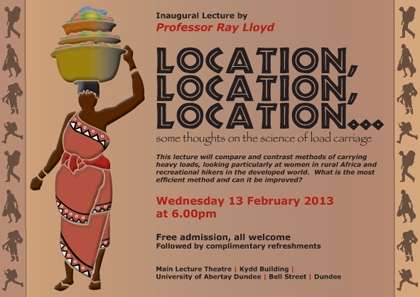Professor debunks one of sport's biggest myths

One of the most enduring myths that has slipped into public consciousness has been debunked by a sports science professor at the University of Abertay Dundee.
Thanks to a paper published in the journal Nature back in the 1980s, it has been accepted for years that the way women in developing countries carry water and firewood on their heads is the most energy efficient.
However, research carried out by Professor Ray Lloyd, Head of the School of Social and Health Sciences at Abertay University, has revealed that this is far from the case.
In a public lecture to be held at the university on the evening of Wednesday, February 13, he will be discussing how he made this discovery, and shedding new light on how it was that we originally came to the wrong conclusions about this.
He will also discuss his research in the context of groups such as the military and emergency services who, like women in the developing world, are faced with the daily burden of having to carry heavy loads.
Speaking ahead of the event, Professor Lloyd said:
"One of the most recognisable images of women in developing countries is seeing them carrying heavy buckets of water or stacks of firewood on their heads.
"And for years, we've been admiring their good posture, assuming we've been missing a trick by carrying heavy things in our arms or on our backs.
"But that belief was all down to a single research paper that was published back in the 1980s. There were only five people involved in that study, yet its findings are referred to over and over again – both in the scientific literature and among the wider population.
"So, in this lecture, I'll be explaining how that happened, why it was unfortunate and, hopefully, making some elements of 'science' seem a bit less baffling and a bit easier to understand.
"I'll also be talking about what my own research in this area has found and what we've been working on since we established the difficulties with head-loading."
Professor Lloyd is Professor of Human Performance and Head of the School of Social and Health Sciences at Abertay University.
He began his career working as a maths teacher at a secondary school in Inner London before taking the opportunity to work overseas to teach maths and PE in Botswana.
During his eight and a half years in Botswana he developed a career in coaching and spent his last few years there as Director of Coaching for the Botswana Amateur Athletics Association, having previously held various National Coaching positions and coaching athletes to 25 national records in the sprints, jumps and throws.
He has been involved in Higher Education since he returned to the UK in 1996, continuing to work in the area of Sports Performance as a conditioning coach in the English Premier League, First Class cricket and for the Lawn Tennis Association, and as a researcher in the area of strength training.
He also developed a life-long interest in the area of human load carriage and is now one of the world's most published scientists in this field.
He explains:
"Living in Botswana I couldn't help but be fascinated by head-loading and wanted to know more about it. As a sports scientist I am interested in how people move and how we can improve performance, so my research seemed to naturally stray into looking at load carriage.
"Having to carry heavy loads is an everyday activity for a number of different people – not just rural dwellers in the developing world, but for the military and emergency services as well.
"In this lecture, I'll demonstrate how we measure the economy of different load carriage systems and I'll look at both traditional and modern load carriage methods from a number of different perspectives – for example, physiological, biomechanical as well as what we call subjective perceptual, where we examine people's perceptions of pain and discomfort.
"If you've ever tried to carry 20 litres of water over any distance – short or long – you'll know it's very difficult. But for millions of women in developing countries, it's part of daily life. During my research – which was actually conducted in South Africa – we heard lots of stories from Xhosa women about the neck and back pain head loading caused, which makes us concerned about long term harm to the women.
"Of course, the only real solution for the women who have to endure this is the provision of piped water and better road systems. Knowing the truth about the pain, discomfort and difficulty of head-loading might just make action come sooner."















